Corpus-based Teaching Materials for Oil and Gas Students
Musaeva Fariza has been an ESP lecturer for 9 years now, graduated from the World Languages University, began working as a teacher in 1999 at school, and from 2013 started working at the University as an ESP teacher. She has two co-authored manuals for ESP students, this year she has got TESOL/TEFL certificate. Email: musayeva_fariza@mail.ru
Introduction
English for specific purposes (ESP) teachers often face dilemmas when presenting the right material to students in the teaching process. The oil and gas field is no exception to this issue. There are several directions in the oil and gas sphere, such as geology, transportation, drilling etc., so all students have their specific subject to study, i.e. future geologists deal with everything that is related to the exploration of the oil field. However, piping designers and the students in the other directions do not touch these topics due to they have their specialty. Considering this fact, the need for creating teaching materials for each direction in oil and gas field has become especially important. This will enable each specialist to develop their professional skills in their particular sphere in the English language. So, having this goal in mind, the main idea of the study is to create teaching materials for the students in the transportation direction on the basis of a corpus compilation. In the current research as piloting groups the third year students in the direction of transportation and construction of pipeline were chosen. Corpus-based activities were prepared for 5 lessons at the end of the semester. One of the five lessons as well as the students’ feedback has been presented in this article.
Innovative approach in teaching ESP
There are numerous approaches in teaching vocabulary as it has been a complex area for foreign language learners. Among them corpus-based materials are considered the newest and innovative ones according to Sinclair, who claimed that a corpus is a source to access a huge amount of data that can be processed and used as lesson materials in teaching process.(as cited in Binkai, 2012, p.131). Binkai (2012) also took the attention to vocabulary learning through corpus-based contexts. [1, p. 4]. In most cases as other investigations claim that successful implementation of corpora in classes reflects how students are able to digest the given material and whether it will be useful in their further development. Corpus-based exercises are based on corpus information pre-selected by the teacher and presented to students in the form of hand-outs. In this case, activities are based on the needs of students, their level of language proficiency, goals and stages of learning, the characteristics of the linguistic phenomenon being studied. Corpus-based exercises provide authentic language material that can be used in the development of transformational, substitution, and other types of tasks. [3, p. 320]. Exercises created on the basis of corpus are most suitable at the stages of familiarization with specialized vocabulary, since the material in the corpus is aimed at the exact field. As an example there are various directions in Oil and Gas industry, such as, geology, transportation, drilling etc. Undoubtedly, there are enough sources to provide lessons with their specialty. However, those sources are needed to be updated or sometimes there are not exactly topics there ESP students feel free in their specific field. In some cases the students ask some questions which are too technical, such as the usage of a gadget and the difference between two facilities, and as an ESP teacher I am unable to reply. So, here arose the need for creating teaching materials for each specific sphere, taking into account that the students should be aware of the entire topic in their native language.
The Corpus of English for Oil and Gas (CEOG)
The initial step was to create a corpus for each direction, so I compiled my own corpus for the students in the transportation faculty. (the Corpus of English for Oil and Gas (CEOG). The very beginning of corpus building process included: 1) contacting content teachers and 13 responses were obtained, 2) making a questionnaire for graduating students (82 responses), and for the 3) practitioners who work in Oil and Gas filed (331responses). As a tool sketchengine.eu was used in the corpus compilation process. Using this application corpus-based teaching materials were developed for the use in the ESP classroom.
In the current research the third year students in transportation and construction of pipeline direction were chosen as piloting groups. The corpus-based activities were prepared for 5 lessons at the end of the semester. At the start, the students were informed that the conducted lesson was going to be like an experiment which would be different from the previous ones as it had been created on the basis of Corpus of English for Oil and Gas (CEOG).
Corpus-based materials
As an example, one lesson is provided created from the corpus (CEOG). At the start of the lesson in order to involve the students in the speaking process, they were divided into groups of four and gave some information about the given topics. At the start of the lesson in order to involve the students in the speaking process they were asked to find the topic of the lesson by giving them the definition of the equipment, they were divided into groups of three and after reading it, they gave their suggestions trying to find what it was. These kinds of activities help learners to understand and think carefully.
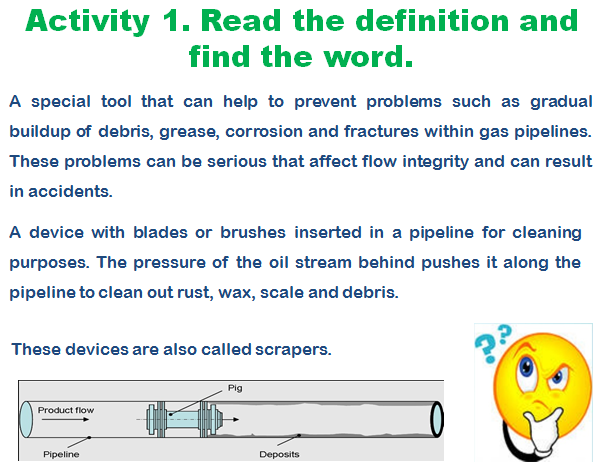
Before doing the reading task, it was a good idea to introduce the students with the vocabulary that they would come across in reading the text. Considering that most students’ level is not high enough and they will need the translation of the words in their native language, the words were given with the definition in English and the Russian version. However, the students first read the definition of the words in English, after that in Russian.
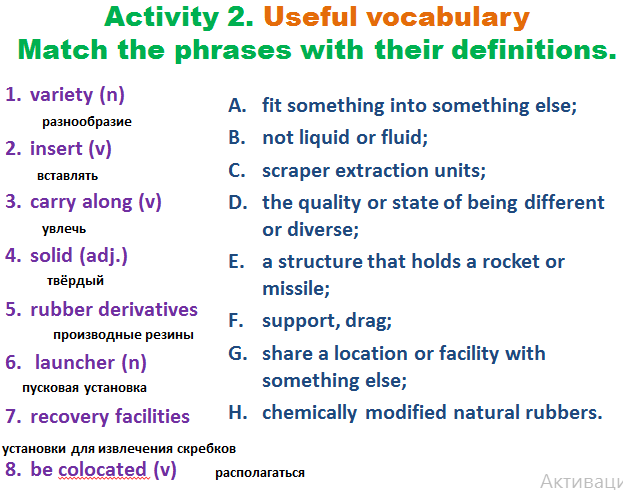
As the students’ direction is transportation, the theme of the lesson was “Pipeline inspection gauge” which was suitable and useful for them and they read and discussed it with great interest. The words that they learned before reading were underlined so they would pay attention to them.
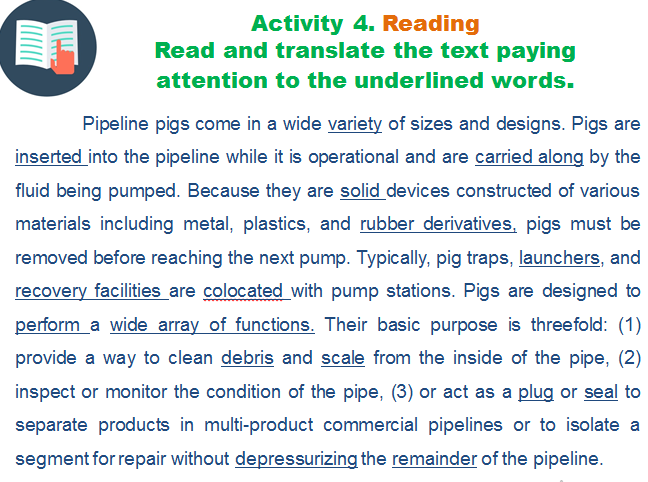
The following activity was listening task. The students were able to complete the task without difficulties, as the topic was their specialty, i.e. they had already been aware of the content of the chosen material in their native language. It was found out according to the content teachers and students’ answers in the questionnaire.
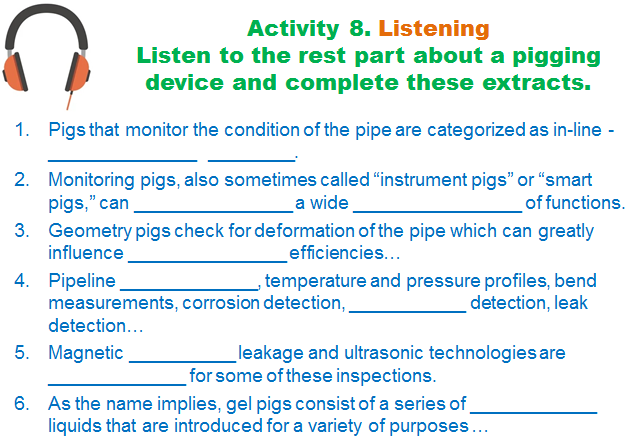
The next activity was “Synonym match” which helped to intensify their vocabulary after reading. All the students did this task very quickly and with enjoyment.
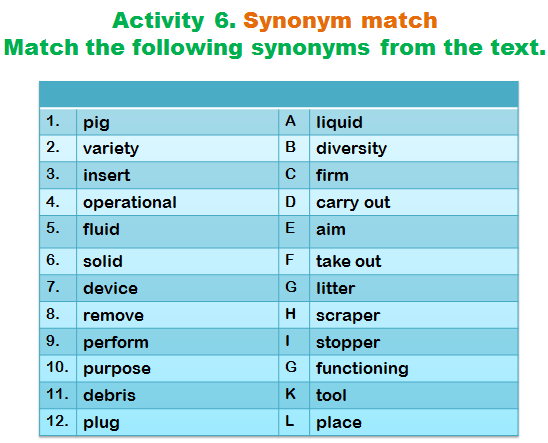
The final stage of the lesson was to generalize all the covered material, so in the next activity the students worked in groups of four and expressed their ideas about “Pipeline inspection gauge” which was the topic of the lesson. All the students took active part in this activity, and the most exciting thing was that they were able to use all the vocabulary while speaking.
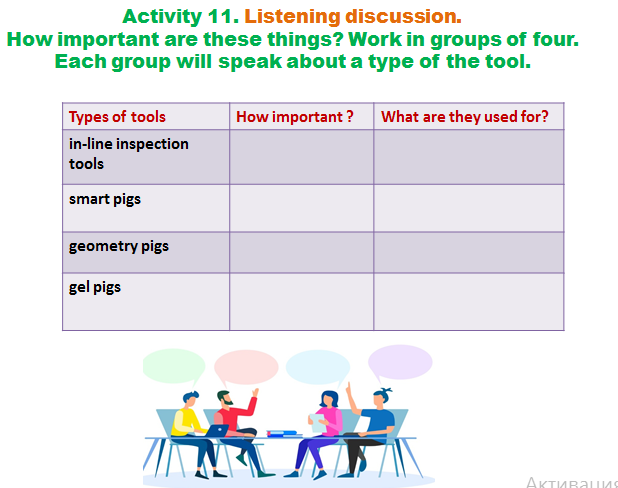
When the lesson was over, as an ESP teacher I was fully satisfied that the goal (to teach specialized vocabulary) set before the lesson was accomplished. However, it was only my opinion, so it was also necessary to know the students’ thoughts about the lesson. To obtain the students feedback, at the end of each lesson online questionnaire was done to get their opinion about the lesson. Providing the reliability of the questionnaire, it was anonymous, where the students did not have to input their name.
The first question was to write their opinion about the lesson and as the reply shows everyone answered positively.
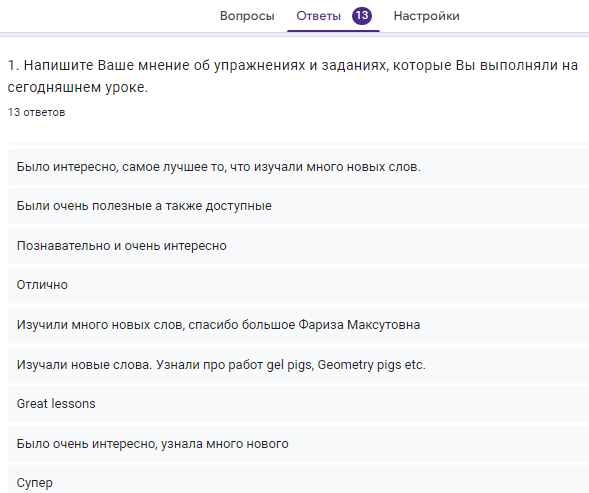
The second question was to select how the lesson was interesting from their point of view. According to the results, all the students considered the lesson was the most interesting.
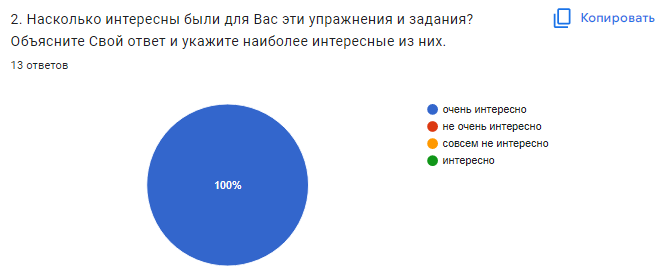
The next question was to indicate the usefulness of the English language. The received replies demonstrated that 30.8 % students’ answers were useful, 69.2 % considered very useful, options like not very useful, and not useful at all were not chosen. After receiving the answers, it became clear that most students confirmed the usefulness of the English language.
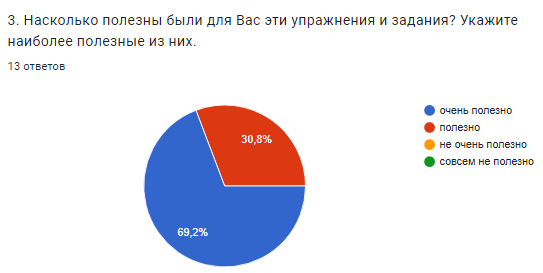
The last question was to choose the most interesting task in the listed aspects of activities that they have had during the lesson. All activities have been presented so that the students had an opportunity to choose on one them by clicking. At the end of the lesson the link of the online questionnaire were sent to them and the results were obtained. As an example one question and its results is presented below.
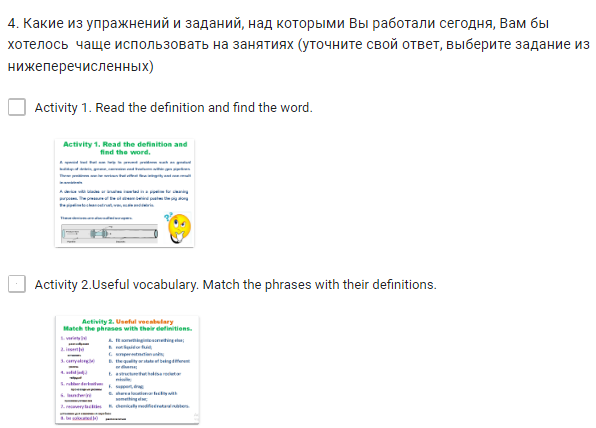
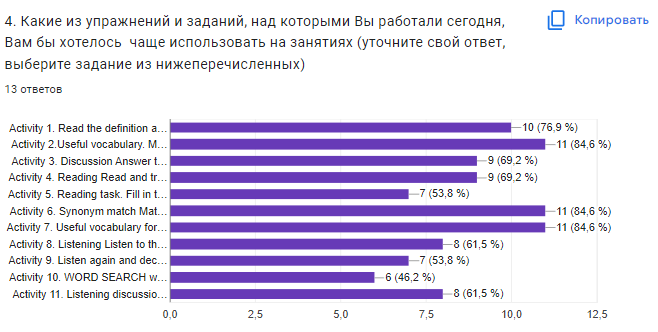
According to the obtained results, most students liked useful vocabulary and synonym match. The other places took read definition and discussion. It shows that the students were really interested in learning new words in their sphere and talking about it. However, as the results show they do not prefer some reading task and making word combinations.
Conclusion
In conclusion it should be noted that the right approach to various activities in the classroom helps to create internal visibility for students, which is necessary for presenting a certain situation in the classroom, synchronizing mental and physical actions with speech in a foreign language. It enables not only work out the lexical material well, but also form the imagination and linguistic instinct. Activities allow learners to make the process of learning a language more dynamic and interesting.
References
Binkai, J. (2012). An Empirical Study on Corpus-driven English Vocabulary Learning in China. English Language Teaching, 5(4).
Granger, S., 2003. The International Corpus of Learner English: a new resource for foreign language learning and teaching and second language acquisition research. TESOL Quarterly, 37 (3), pp: 538–546.
Hsu, Hui-li and Chu-Ren Huang. 1995. Design Criteria for a Balanced Chinese
Corpus. Proceedings of ICCPOL'95, Hawaii. pp. 319-322.
O’Keeffe, A. From Corpus to Classroom: language use and language teaching/A. O’Keeffe, M. McCarthy, R. Carter.– Cambridge: Cambridge Univ. Press, 2007.– 315 p.
Please check the Pilgrims f2f courses at Pilgrims website.
Please check the Pilgrims online courses at Pilgrims website.
Dara and Friends - for Young Readers of Fairy Tales
Rostislava Grozdeva, BulgariaA Poem-based Activity
John Kay, UKSEO Scout in a Writing Task: Scouting Out the Way to Write a Lead Section in a Wikipedia Article
Ronnakrit Rangsarittikun, ThailandSpin the Question
Pak Man Au, CanadaPeer Reviewing in Writing: An Ongoing Activity
Anila R. Scott-Monkhouse, ItalyStepping Off of the Eternal Phonics Treadmill
George Loetter, South AfricaProblems of Using Gerunds to Open Sentences in Academic Writing
Lander Hawes, UKCorpus-based Teaching Materials for Oil and Gas Students
Musaeva Fariza, Uzbekistan